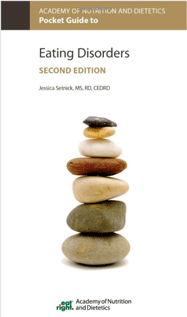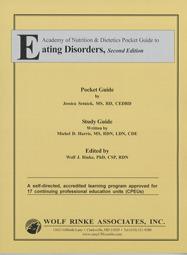|
Eating Disorders, Second Edition
| C306 |
17 CPEUs |
HARD COPY |
$144.95 |
|
This comprehensive CPE activity, organized according to the Nutrition Care Process, includes sample PES statements, DSM-5 diagnostic criteria, and guidelines for providing nutrition education that will enable RDNs in any area of practice to provide improved care for individuals experiencing dysfunctional eating behaviors. More specifically you will discover how to:
- Relate abnormal lab values to an individual’s disordered behaviors;
- Implement appropriate Nutrition Interventions based on the Nutrition Assessment;
- Formulate enteral and parenteral Nutrition Interventions and Monitoring and Evaluation plans that prevent refeeding syndrome;
- Identify potential nutrition effects of psychoactive medications and how they may complicate treatment;
- Relate a client’s medical complications to their disordered behaviors;
- Apply the concepts of Motivational Interviewing, Cognitive Behavioral Therapy, and Dialectical Behavior Therapy when educating and counseling clients.
Share with a friend and Save! Click here for important information about
sharing.
To order an ADDITIONAL Reporting Form click below:
| C306F |
17 CPEUs |
REPORTING FORM |
$40.00 |
 |
Eating Disorders, Second Edition
© 2024 Wolf Rinke Associates. All rights reserved for this self-directed accredited learning activity. Reproduction in whole or part without written permission, except for brief excerpts, is prohibited.
LEARNING OBJECTIVES
Upon completion of this CPE activity you will be better able to:
- Identify the four steps of the Nutrition Care Process (NCP) and the domains of each step;
- Apply the NCP when treating clients with eating disorders;
- Apply the DSM-5 Criteria for eating disorders when implementing the NCP;
- Discuss the role of the Registered Dietitian Nutritionist (RDN) when treating individuals with eating disorders;
- Select appropriate questions to ask clients during the interviewing process of the Nutrition Assessment;
- Relate abnormal lab values to an individual’s disordered behaviors;
- Formulate accurate Nutrition Diagnosis statements;
- Implement appropriate Nutrition Interventions based on the Nutrition Assessment;
- Recommend therapeutic diets that support weight goals;
- Identify clients who are at risk for refeeding syndrome;
- Identify situations in which enteral and parenteral Nutrition Intervention are warranted;
- Formulate enteral and parenteral Nutrition Interventions and Monitoring and Evaluation plans that prevent refeeding syndrome;
- Evaluate a client’s self-imposed dietary restrictions to determine the potential for nutrient deficiencies;
- Identify potential nutrition effects of psychoactive medications and how they may complicate treatment;
- Apply the Principles of Good Nutrition for Eating Disorder Recovery when education and counseling clients;
- Discuss the factors that determine ideal weight with clients;
- Relate a client’s medical complications to their disordered behaviors;
- Apply the concepts of Motivational Interviewing, Cognitive Behavioral Therapy, and Dialectical Behavior Therapy when educating and counseling clients;
- Redirect clients when conversations become unrelated to nutrition;
- Communicate a client’s NCP to treatment team members;
- Discuss the role of each member on the treatment team;
- Identify indications that warrant referrals to other professionals;
- Recommend appropriate levels of care for clients.
ABOUT THE AUTHOR OF THE POCKET GUIDE
The Pocket Guide is written by Jessica Setnick, MS, RD, CEDRD, a noted eating disorder expert.
ABOUT THE AUTHOR OF THE STUDY GUIDE
Michel D. Harris, MS, RD, LDN is a registered and licensed dietitian in Chicago and currently owns a private practice specializing in eating disorders. She also works as an inpatient dietitian at Swedish Covenant Hospital, and teaches food science classes and labs as an Adjunct Professor at Benedictine University.
She earned her BS in Nutrition and MS in Exercise Physiology at Benedictine University, and completed her Dietetic Internship at Edward Hines Junior VA Hospital. After obtaining her Registered Dietitian (RD) status in 2000, she worked in various facilities as a clinical and community dietitian until 2010.
Starting in 2011, Michel took advantage of the numerous opportunities that the field of dietetics started to offer, and helped develop a diabetes outpatient program at a community hospital in Chicago after obtaining her Certified Diabetes Educator (CDE) credential. Her other endeavors included leading grocery store tours, developing and implementing wellness programs at her husband’s church, and completing editing and writing projects as a consultant.
Most recently, she obtained her certification as a Breastfeeding Peer Consultant from Rush University Medical Center in Chicago after her son spent almost five months in the Neonatal Intensive Care Unit (NICU), and plans on continuing her education in the science of breastfeeding and nutrition for infants and childhood development.
She is a member of the Academy of Nutrition and Dietetics, American Association of Diabetes Educators, and the Sports Cardiovascular and Wellness Nutrition (SCAN) dietetic practice group. In her spare time, she enjoys being with her family, crafting, taking road trips, and watching her son achieve all of his milestones.
Return to the top of page
If you prefer to order by phone, mail
or fax click below
or click here to contact us with
other questions.
For information about our other products and
services return to the sidebar at the top of the page.
|
|
|



